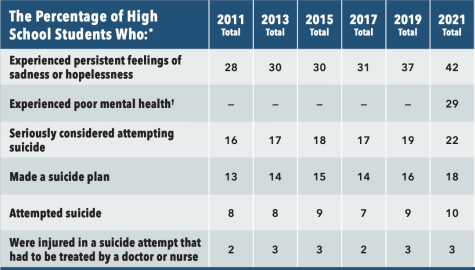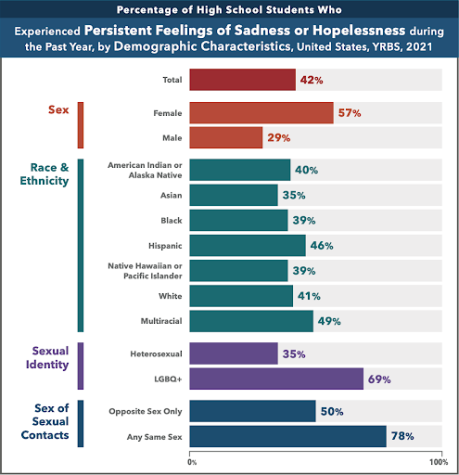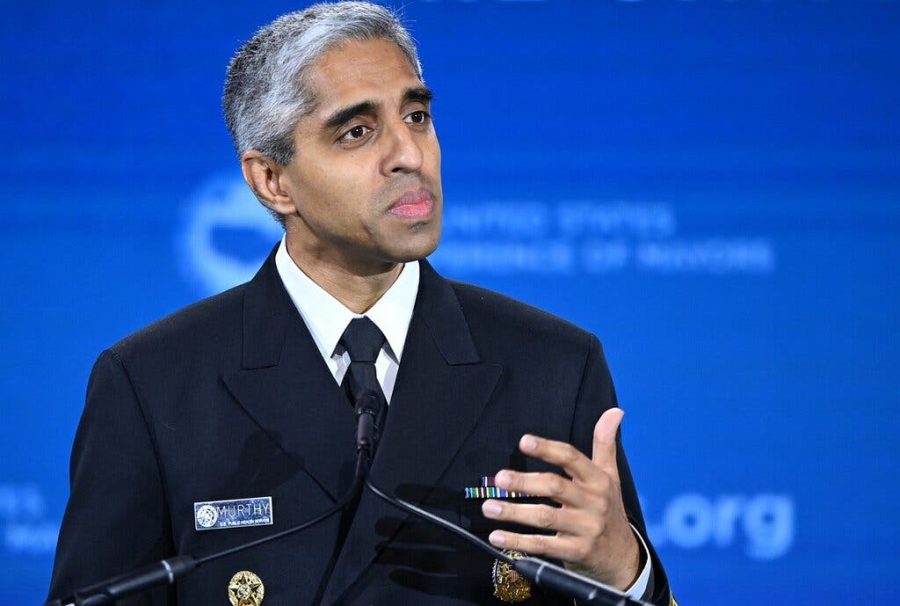Teenagers’ Struggle With Mental Health
Student Wellness and Mitty
April 30, 2023
The surgeon general has declared it “the defining public health crisis of our time.” The American Academy of Pediatrics has declared it a national emergency. Not COVID-19, but teenage mental health. The CDC’s newly released 2021 Youth Risk Behavior Study revealed the startling magnitude of this issue.
The CDC conducts the Youth Risk Behavior Study every two years and in fall 2021 surveyed almost 17,000 American high school students. The survey includes topics of sexual behavior, violence, substance use, and mental health.

Despite continuing decreases in substance use, risky sexual behaviors, and rates of bullying, the CDC reported increases in the number of students who reported experiencing violence and who reported struggles with mental health. In 2021, 42% of surveyed teens reported persistent feelings of sadness or hopelessness. Additionally, 18% reported making a suicide plan and 10% reported attempting suicide. 2021’s statistics continue a ten year trend of consistent increases in persistent sadness and suicidal ideation.
According to the American Psychological Association, this drastic decline in young people’s mental health is largely due to the Covid-19 pandemic and the lockdown that left most children in the country in isolation until the fall of 2021. This resulted in an extensive increase of social media use among adolescents, who used it to communicate with their peers and pass the time.
Although this helped some better connect with their friends during the pandemic, it led many others to face online harassment and discrimination. Moreover, many developed self-image issues as a result of unrealistic beauty standards propagated on social media. Girls, LGBTQ youth, and people of color continue to be the most likely to have such a decline in mental health, according to the CDC.
Among girls and LGBTQ students, rates of persistent sadness were reported at 57% and 69%, respectively the highest among any demographic group.

Based on volume 101 of the journal Computers in Human Behavior, adolescents and especially girls are more likely to develop body image issues at a younger age when faced with such impossible standards. Additionally volume 127 of the journal found that children younger than 11 are more likely to be harassed and discriminated against on Instagram and Snapchat.
This data is, of course, relevant to Mitty as a high school. To collect more specific data about the Mitty community and to inform the school’s wellness initiatives, the school has historically partnered with Challenge Success—a non-profit associated with the Stanford University Graduate School of Education. As part of this agreement, students are surveyed annually about their well-being and academics with the last survey being administered on March 16th in 2023.
This data has in fact led the school to hire a tenth counselor who will be joining the department in the fall of 2023.
Mitty’s partnership with Challenge Success was also key to the formation of the Student Wellness Committee—perhaps best known for this year’s Student Wellness Month held in March. Created under Principal Kate Caputo during the 2013-2014 school year, the Student Wellness Committee includes students, teachers, and parents and in the words of committee chair Mr. Jim Fallis is intended to “dissect [the Challenge Success] data and give voice to students and teachers and parents”.
This year the committee elected to create Student Wellness Month in March. Utilizing Mitty Minutes, posters, and various on campus activities, Student Wellness Month centered around finding balance in life. The month was divided between each of the four classes who got to choose the topic of their week: time management, sleep, stress management, and nutrition.
Mr. Fallis affirms that Student Wellness Month is likely to return in March next year. In the meantime, Mrs. Caputo, Mr. Fallis, and eventually the Student Wellness Committee will be examining the data to improve next year’s Wellness Month and develop new initiatives.
Additionally, a new, student-led mental health initiative, helmed by Olivia Lawson ‘25, is Mitty’s chapter of Bring Change to Mind. Bring Change to Mind is a national non-profit organization that advocates for mental health awareness and works to destigmatize mental illness. Olivia approached her counselor with this idea in the spring of 2022 and, in the fall, the club was founded after a contract was revised around student privacy concerns.
This new addition to the campus’ mental health resources is a part of the Counseling Department, as opposed to Student Activities or other student life organizations. This distinction is important because, as counselor Ms. Alisa Guglielmo puts it, “Bring Change to Mind is really focused on education and awareness around mental health,” whereas other student-led approaches focus more on the social aspect.
According to Olivia, the point of Bring Change to Mind is simply for students to have “a place where students can feel comfortable to come and learn about other mental health issues to either help themselves, to show that they’re not alone, and/or to help their friends”.
The surgeon general echoes both Ms. Guglielmo’s and Olivia’s message when looking at mental health broadly: “We’re asking for individuals to take action to change how we think and talk about mental health so people with mental health struggles know that they have nothing to be ashamed of, and it’s OK to ask for help.”
